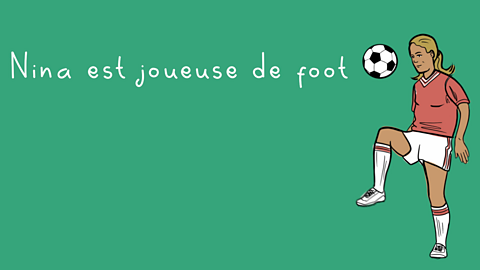The perfect tense: How to talk about the past in French
To talk about something you did in the past, you're going to need the perfect вҖҺвҖҺ tense.
The perfect tense is made up of two parts. The first part is often the verb avoir вҖҺ- вҖҺto have and the second part is the past participle.вҖҺ
For example, j'ai іҫІ№ІФІөГ© un sandwich - I have eaten a sandwich.
You take the form of avoir you need - j'ai and add it to the past participle of the вҖҺverb you need.
in this case, the past participle of manger is іҫІ№ІФІөГ©вҖҺ.
J'ai іҫІ№ІФІөГ©. вҖҺ
For -er verbs the past participle ends in -Г©.вҖҺ
Other verbs follow different patterns. вҖҺ
For lots of verbs ending in -ir like finir to finish the past participle ends in -i:
J'ai fini - I have finished.
prendre - to take - the ending of the past participle is -isвҖҺ:
Elle a pris le bus - She took the bus.
Normally ones to do with movement that work in a different way.вҖҺ
Instead of avoir they take ГӘіЩ°щұр and the past participle. вҖҺ
Je suis allГ© Г la plage - I went to the beachвҖҺ.
Il est rentrГ© Г la maison - He came home.вҖҺ
So that's the perfect tense: J'ai fini - I have finished.вҖҺ
When to use the passГ© composГ© (perfect tense)
The passГ© composГ© (perfect tense) is used to talk about things that happened in the вҖҺpast. It is often used with past time phrases:вҖҺ
- JвҖҷai ВбҙЗіЬГ© au foot hier - I played football yesterday.вҖҺ
- Tu as іҫІ№ІФІөГ© un sandwich Г midi? - Did you eat a sandwich for lunch?вҖҺ
- Elle a °щұрІөІ№°щ»еГ© un film le week-end dernier - She watched a film last weekend.вҖҺ
Here are some useful past time phrases:вҖҺ
| French | English |
|---|---|
| hier | yesterday |
| hier soir | yesterday evening / last night |
| lundi dernier | last Monday |
| la semaine derniГЁre | last week |
| le mois dernier | last month |
| lвҖҷannГ©e derniГЁre | last year |
How to form the passГ© composГ©
To form the passГ© composГ©, you need three parts:вҖҺ
вҖҺ1. A noun or pronoun such as je (I), tu (you), or il/elle (іуұр/Іхіуұр).вҖҺ
2. An auxiliary verb - this is either avoir (to have) or ГӘіЩ°щұр (to be).вҖҺ
вҖҺ3. A past participle such as ВбҙЗіЬГ© (played) or °щұрІөІ№°щ»еГ© (·ЙІ№іЩіҰіуұр»е).вҖҺ

The auxiliary verb avoir needs to change according to who did the action (I, you, вҖҺhe, she, etc) but the past participle stays the same.вҖҺ
Forming past participles with regular verbs
Regular -ER verbs
Most verbs in French end with -er. To form the past participle of an -ER verb, you need вҖҺto remove the -er from the infinitive and add -Г©:вҖҺ
- jouer (to play) - jвҖҷai jouГ© - I played.
- manger (to eat) - il a mangГ© - He ate.
- habiter (to live) - tu as habitГ© ҙЗГ№? - Where did you live?вҖҺ
- regarder (to watch) - jвҖҷai regardГ© - I watched.
Regular -IR verbs
To make the past participle of a regular -IR verb, you need to remove the -ir from the вҖҺinfinitive and add -i:вҖҺ
- finir (to finish) - jвҖҷai fini - I finished.вҖҺ
- choisir (to choose) - tu as choisi? - Did you choose?
Regular -RE verbs
To form the past participle of regular -RE verbs, you remove the -re from the infinitive вҖҺand add -u:вҖҺ
- vendre (to sell) - jвҖҷai vendu - I sold.
- entendre (to hear) - elle a entendu - she heard.
вҖҺ Irregular past participles in the passГ© composГ©
Some common verbs have irregular past participles in the passГ© composГ©. This means вҖҺthat they donвҖҷt follow the same rules as regular verbs.
Here are some useful irregular verbs and their past participles with examples:вҖҺ
| English | french infinitive | past participle | Example |
|---|---|---|---|
| to have | avoir | eu | JвҖҷai eu un accidentвҖҺ - I had an accident.вҖҺ |
| to be | ГӘіЩ°щұр | Г©іЩГ© | Tu as Г©іЩГ© malade? - Have you been ill?вҖҺ |
| to do | faire | fait | Il a fait ses devoirs - He did his homework.вҖҺ |
| to drink | boire | bu | Elle a bu du jus dвҖҷorange - She drank orange juice.вҖҺ |
| to take | prendre | pris | JвҖҷai pris une photo - вҖҺI took a photo. вҖҺ |
Forming the passГ© composГ© with ГӘіЩ°щұр
Some verbs (usually verbs of movement) use ГӘіЩ°щұр in the perfect tense. Aller is an example of this:
- Je suis allГ© au supermarchГ© - I went to the supermarket.вҖҺ
- Tu es allГ© Г Nottingham? - Did you go to Nottingham?вҖҺ
- Il est allГ© au parc - He went to the park.вҖҺ

If you are talking to or about a female person, the past participle needs to agree with the вҖҺperson as an adjective would. An вҖҳeвҖҷ is added to the end of the past participle.вҖҺ This is only when the auxiliary verb is ГӘіЩ°щұр.вҖҺ
For more than one person you must add an 's'.
- Je suis allГ©e Г Nice - I (female) went to Nice.вҖҺ
- Tu es allГ©e en Espagne? - Did you (female) go to Spain?вҖҺ
- Elle est allГ©e au centre sportif - She went to the sports centre.вҖҺ

Quiz
Find out how much you know about the perfect tense in French with this short quiz.
More on Grammar
Find out more by working through a topic
- count1 of 8

- count2 of 8

- count3 of 8
